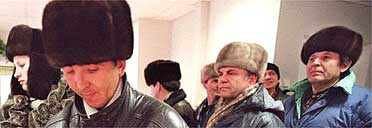
The Tupolev pitches and yaws its way down through the Arctic cloud, seat belts dangling in the aisle, a grey curtain, tightly drawn, separating the gloomy throng of passengers from the party going on in the pilot's cabin.
Three and a half hours of foodless flight from Moscow and you will find yourself landing in Vorkuta, my candidate for the least friendly place on earth.
I don't want to be unkind to the 180,000 people who still eke out a living in the former Gulag mining town carved from the permafrost. But I would be prepared to bet that 179,999 would be on the plane out if they could afford the fare.
The exception is the KGB guard at the airport terminal who still derives evident satisfaction from perusing each stamp on your passport, and every line of your three-page visa. He behaves as if he is unaware that the town has been "open" to foreigners for about a decade.
And yet, as I was to discover, it's not getting into Vorkuta that is the problem, but getting back out again.
Vorkuta only exists because a demonic dictator called Stalin put it there, creating a hard labour camp which killed up to half a million people. Their graves are marked by wooden crosses, upon which only numbers and letters appear. A-Gl, A-53, A-79. Many of the crosspieces have fallen off, leaving only wooden stumps shivering in the wind. Officially the graveyards are found beside the mines, but in reality the whole city is built on the bones of Stalin's victims. They are under the railway, under the streets, under the buildings, in the fields.
Founded 67 degrees north of the equator, Vorkuta is not a place where people should be asked to live. Last winter temperatures reached -50C: cold enough to turn cars into frozen blocks of metal. Winter lasts for eight months a year here, although in fairness the weather isn't always that bad: the temperature has been known to reach a balmy -15C in May.
On last inspection, the city boasted one hotel which managed to feel cavernously empty while simultaneously being fully booked. Boris Yeltsin's bodyguards - I was there to cover an election campaign - weren't in a party mood. By my calculation, they appeared to require one floor each. The old communist neon slogans, praising the miners of Vorkutaugol (Vorkuta coal) for their record breaking production, hung unlit from one of the tallest buildings on Lenin Street.
It was not long after El Presidente himself had left that my gaze turned longingly to the Tupolev still parked at the end of the main street.
The flight out was overbooked. I presented myself at the kiosk and confidently placed my ticket down on the worn ledge. The oxygenated blonde on the other side of the glass counter was unimpressed and kept examining her cracked purple nails. Nothing moved her. Accreditations, business cards, the ceaseless patter of how if the president had moved on, we journalists needed to move on with him. As the Tupolev started its engines up, a weekend in Vorkuta loomed.
I had a brainwave. I stopped behaving like a preposterous, overblown westerner and started bleating, pleading, begging. I was, after all, just another of life's supplicants. Out came the photographs of my baby twin sons. Suddenly it was their birthday. Look, I had already bought their presents, I said, pointing to the bag which contained a battered laptop wrapped in the day's papers. Who would give them their presents if I was stuck in Vorkuta?
The ice-maiden began to thaw. She sighed. She too was a parent, with children living far away. Out came her family snaps. Her hand moved reluctantly and ever so slowly over to the thumbed wad of boarding passes. I began praying. Five minutes later I was back on the Tupolev, listening with pleasure to the party going on in the pilot's cabin. A tune came into my head as we lurched into the Arctic cloud. Arrivederci Vorkuta.
· David Hearst is assistant foreign editor of the Guardian

